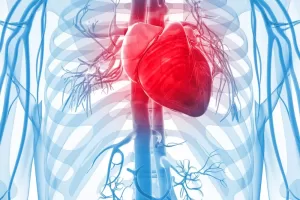High Triglycerides-what are they and what harm can they cause?
What are triglycerides?
- Triglycerides are a common type of fat- in fact they make up about 95% of dietary fats, including animal and vegetable-based fats.
- As your body digests food, triglycerides enter the bloodstream, where they can be used as a source of energy to fuel the body. If not used up, they get stored in fat cells. If energy is needed between meals, it can be released from these fat stores.
- The average lean adult has approximately 15kg of triglycerides stored in their body- this can supply enough energy to last around 3 months!
- However, if you have an unhealthy diet, and tend to eat more calories than you burn, it may cause high triglycerides in your bloodstream- this is known as hypertriglyceridaemia.
Why are high triglycerides bad?
- High triglycerides have been linked to atherosclerosis- this is when plaques of cholesterol, fat, calcium and other substances build up inside your arteries. The resulting blockages increase the risk of stroke and heart attack.
- People who have high triglycerides quite often have other risk factors for heart attack and stroke- including obesity, high blood pressure, high blood sugar, diabetes, and high LDL cholesterol (“bad cholesterol”) levels.
- However, more research is needed regarding the link between triglycerides and atherosclerosis, and whether reducing triglycerides with medication actually reduces cardiovascular risk.
What causes high triglycerides?
High triglycerides are often the result of unhealthy eating and lifestyle, but can also be a sign of other issues, for example
- poorly controlled type 2 diabetes
- hypothyroidism (an underactive thyroid gland)
- liver disease
- kidney disease
- a side effect of medications, including beta blockers, the contraceptive pill, steroids and diuretics.
- familial or genetic conditions (e.g. familial hypertriglyceridaemia)
What are normal triglyceride levels?
A fasting blood test can show whether your triglycerides are normal- this is usually done as part of a routine fasting cholesterol test (also known as a fasting lipids profile).
- Normal triglyceride levels are less than 1.7 mmol/L.
- 1.7 to 2 mmol/L is considered borderline high
- High levels are 2 to 6 mmol/L
- Very high levels are 6 mmol/L or higher
What’s the difference between cholesterol and triglycerides?
Triglycerides and cholesterol are both fats that circulate in the bloodstream, but they have different roles.
Triglycerides are used as fuel, and are stored in fat cells if not used
Cholesterol is used for a variety of functions
- to build cell membranes
- to make bile acids, which digest food
- to make hormones (like oestrogen and testosterone)
- to allow the body produce Vitamin D
High LDL cholesterol (“bad cholesterol”), low HDL cholesterol (“good cholesterol”) and high triglycerides have all been associated with a higher risk of heart attack and stroke. Quite often a person’s LDL and triglycerides are both raised at the same time. Healthy diet and active lifestyle may help, but sometimes medication is recommended.

What is the treatment for high triglycerides?
Reducing triglycerides (and cholesterol) is important, but it’s only one aspect of lowering your overall risk of heart disease and stroke. For example, if you are obese, a smoker, or have poorly controlled diabetes or high blood pressure, it’s vital that these issues are managed too.
If you have high triglycerides, often the first thing your doctor will recommend is a variety of lifestyle changes:
- Achieve a healthy weight through health eating and more exercise (try for 30 minutes of dedicated exercise per day)
- Make sure your daily calorie intake is not more than you need- avoid saturated fats (present in takeaway, fried and processed foods) and sugary foods.
- Try to eat more “healthy fats” such as olive and canola oils, and oily fish such as mackerel and salmon.
- Reduce alcohol consumption- even relatively small amounts of alcohol can increase your triglycerides.
- Quit smoking, make sure your blood pressure is normal, and if you have diabetes ensure it’s well controlled.
Medication:
The decision to start a medication is not just based on the “number” of your cholesterol or triglycerides, but on your overall risk of heart disease and stroke. Your doctor may use a special calculator to figure this out, and will take into account things like overall cholesterol levels, smoking status, family history and other condition such as high blood pressure or diabetes.
It’s not yet proven whether treating high triglycerides with medication reduces risk of heart disease, but if you have other risk factors, or your triglycerides are above 6mmol, your doctor may recommend it.
- Statins are medications that are often used to treat high LDL cholesterol, to reduce a person’s risk of heart attack and stroke. If LDL and triglycerides are both raised, statins may be advised.
- Fibrates are another class of medication which can be used as treatment for high triglycerides- they tend to be used if levels are still high (above 6 mmol/L) or in situations where triglycerides are raised but LDL is normal.
- Omega-3 fatty acids contained in fish oils may reduce triglycerides, but large doses are needed to achieve this effect- therefore they’re used in cases where triglycerides are particularly high (e.g. above 6 mmol/L). High doses of fish oils may lead to side effects such as an upset stomach, belching, and a fishy taste in the mouth.
- Niacin (also known as nicotinic acid) may also be advised in cases where triglycerides are above 6mmol/L. Whilst available as an over-the-counter supplement, it should not be started without consulting your doctor, as it can interact with other medications.
When should you see a specialist about your high triglycerides?
If triglycerides are above 10mmol/L, it may indicate familial hypertriglyceridaemia or some other underlying cause. In this situation, a referral should be considered to a Lipid Clinic or cardiologist.
People with extremely high triglycerides are at risk of a serious condition called “acute pancreatitis”, so it’s very important that treatment is attempted in these cases.
What are the key points to take away about high triglycerides?
- Treatment involves looking at all your cardiovascular risk factors- quit smoking, make sure you’ve got normal blood pressure, maintain a healthy weight, enough exercise, health eating and avoid excess alcohol intake.
- Sometimes medication may be advised- for example, if your levels are very high, or if you have a high overall risk of heart attack and stroke, including a strong family history.
- More research is needed about the links between high triglycerides and heart attack and stroke, and the benefits of medication.
Getting a Mental Health Care Plan in Australia: Your Guide
Getting a Mental Health Care Plan in Australia: Your Guide Mental health matters—and if you’re feeling overwhelmed, anxious, or down, a mental health care plan can help. But what is it, and how do [...]
UTI Symptoms and Treatment: What You Need to Know
UTI Symptoms and Treatment: What You Need to Know Urinary Tract Infections (UTIs) are common, uncomfortable, and often disruptive. But what exactly are the signs to watch for, and how can you get relief [...]
Free Mental Health Care Plan Online | Bulk-Billed by Qoctor
Free Mental Health Care Plan Online | Bulk-Billed by Qoctor Discover how to get a free, bulk-billed Mental Health Care Plan (MHCP) in Australia through Qoctor's telehealth service. Accessing [...]




